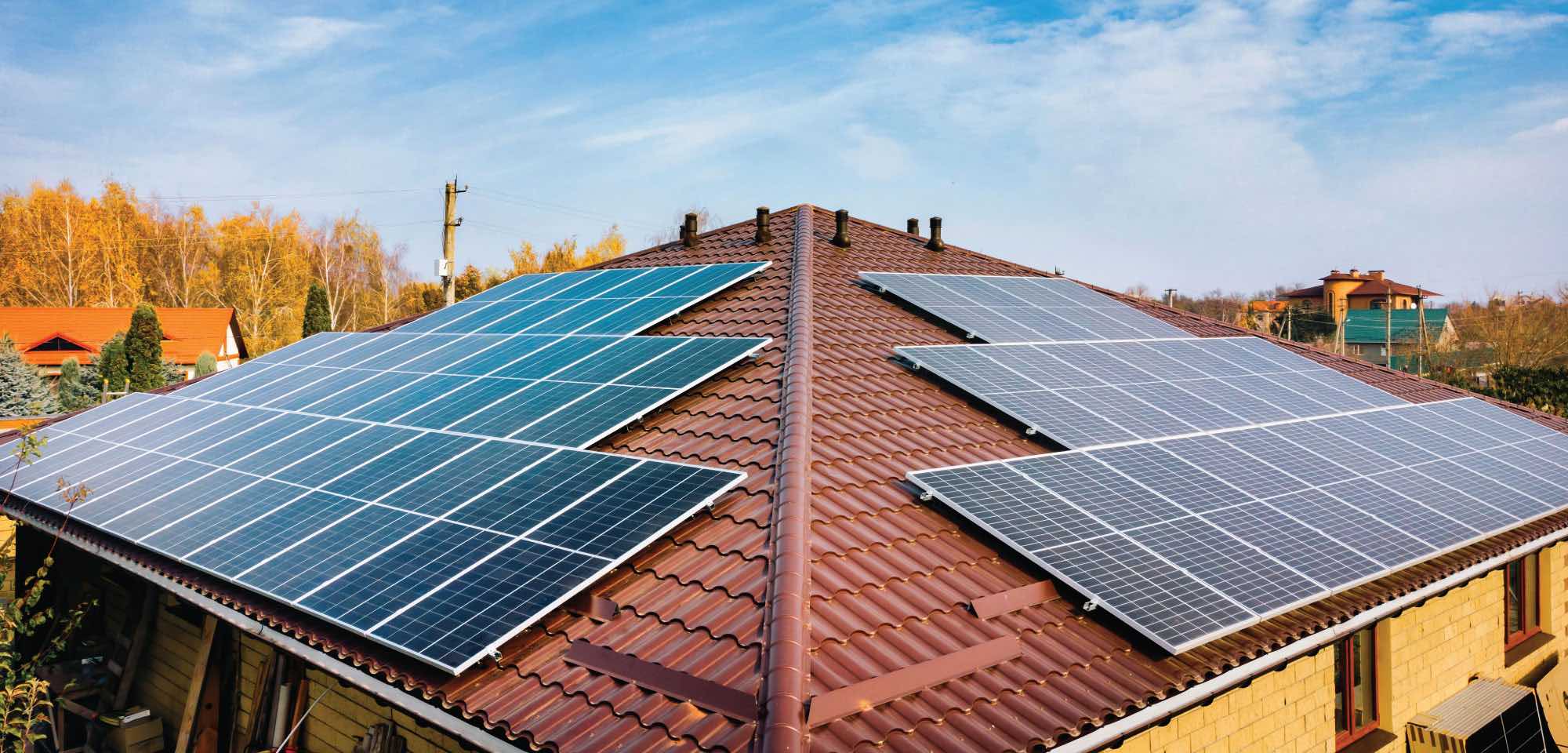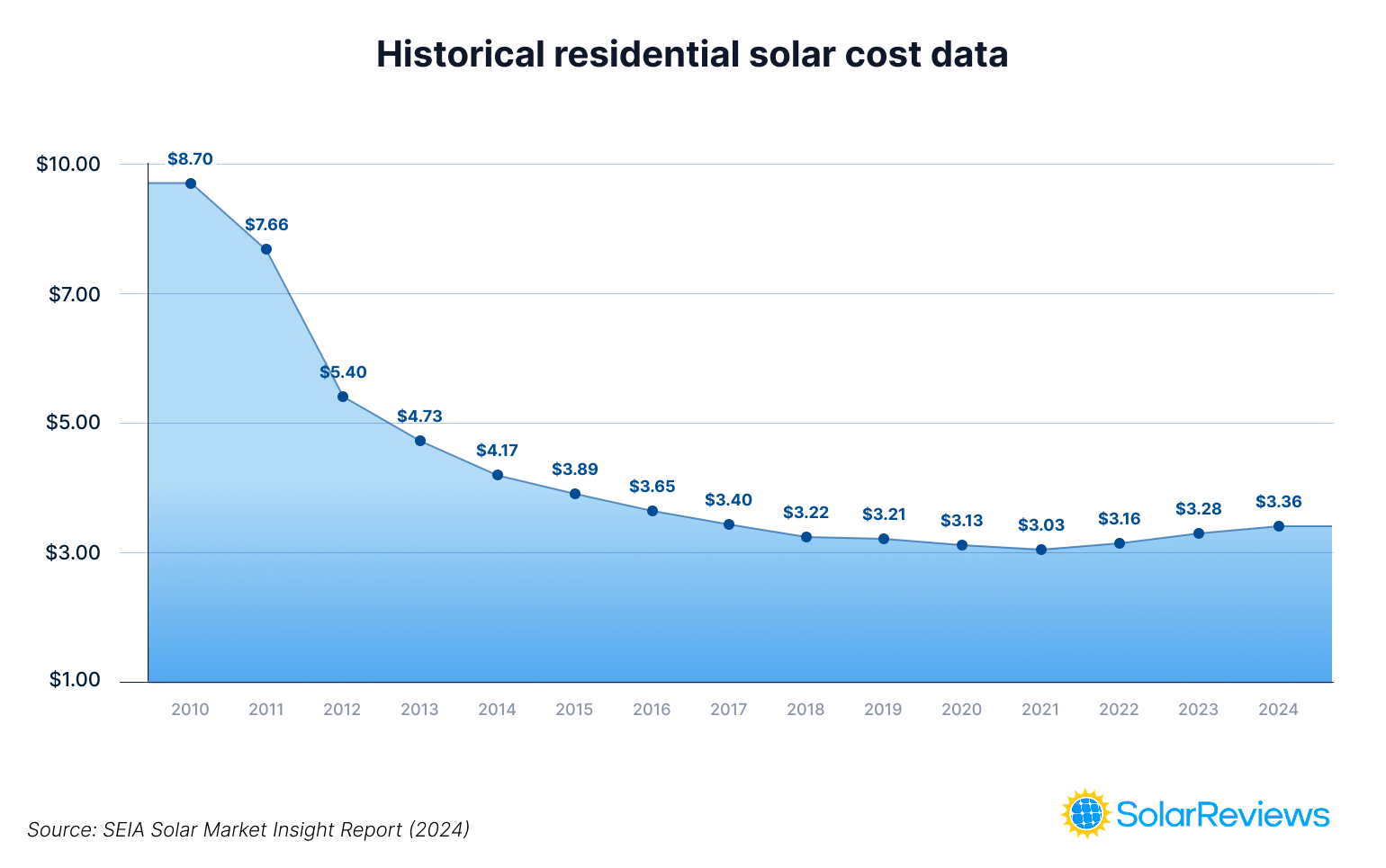Updated 9 months ago
Pros and Cons of Solar Energy: 2025 Expert Guide
Written by
Jamie Smith

Use this calculator to see how solar panels can benefit you
As the need for clean energy becomes more apparent, the shift to renewable energy generation has seen a striking increase. Solar power is a renewable source that can lower our carbon footprint and meet energy demand, all while reducing electricity costs.
As of 2025, the U.S. has reached over 5 million solar panel installations, and that number will continue to grow. However, it’s important to know that while solar has plenty of benefits, it also comes with a list of downsides.
To help you better understand this abundant source of energy, the experts at SolarReviews have compiled a list of the pros and cons of solar energy in 2025.
Solar energy pros and cons at a glance
Pros
-
Clean and renewable energy source
-
Environmentally friendly
-
Electricity bill savings
-
Low maintenance
-
Eligible for incentives
-
Cheaper and more efficient than ever
-
Increases property value
-
Increases energy independence
Cons
-
High upfront cost
-
Intermittent energy source
-
Roof and location restraints
-
Manufacturing and large installations have some environmental impact
-
Value depends on local policy
-
Can increase property taxes and home insurance
8 advantages of solar energy
Between utility bill savings and a reduced carbon emissions– there are plenty of advantages to solar energy systems you may not know about. Here are 8 pros of using solar energy:
1. Solar is a sustainable and renewable energy source
Sunlight is one of the most abundant energy sources on the planet, and harnessing its power using solar panels won’t deplete it’s strength. Because using solar energy doesn’t reduce the amount of sunlight available, it’s considered a renewable resource.
Unlike fossil fuels, which there is a limited supply of, renewable resources like solar are infinite or can be replenished within a human lifetime, making them a far more sustainable solution for our ever-growing energy needs.
2. Solar energy is environmentally friendly
When solar panels generate electricity, they don’t release any harmful greenhouse gas emissions into the atmosphere, making solar a clean power source. Because there are no harmful gasses or particulate matter released when solar energy is produced, it minimizes health and enviornmental impacts.
By increasing the use of solar energy and reducing our reliance on fossil fuels, like natural gas and coal, we make the planet a healthier place to live while fighting climate change.
3. Solar energy provides electricity bill savings
Arguably the greatest advantage to owning home solar panels is that they help reduce your electricity bills. By using the power generated on your roof, you reduce the amount of electricity you use from your power company which lowers your utility bills. Solar panels also help provide insurance against rising electricity costs — as increase continue to rise, so do your savings!
In 2025, the average household can save around $1,500 per year on electric bills with a residential solar panel system. Most homeowners can break even on their solar investment within 10 to 12 years, but actual savings will depend on your specific system and where you live.
Even large-scale solar farms and utility solar systems can make energy costs cheaper. Solar energy is cheap to produce and doesn’t require expensive mining or the same intricate power plants traditional fossil fuels do.
4. Solar energy systems are low maintenance
Solar panels require very little maintenance, especially if they’re tilted at an angle. Rain typically washes away any debris that might affect your solar PV system’s efficiency. However, occasionally cleaning your solar panels to remove excess can’t hurt if you live in a drier, dustier climate.
A huge reason why solar panels are low maintenance is because they have no moving parts, which minimizes the risk of equipment failures. Issues that do come up could be covered by a solar warranty, helping keep relatively low maintenance costs.
5. Solar panels are eligible for incentives
Solar incentive and rebate programs are available throughout the United States to reduce the initial investment costs of solar. Right now, the best incentive to go solar is the federal solar tax credit which earns you 30% of the total cost of your solar installation, applied to your federal income taxes.
There are also upfront rebates and performance-based incentives, like Solar Renewable Energy Credits (SRECs), which can help you earn extra money based on how much your solar system produces.
6. Solar technology is more advanced and more affordable than ever

As of 2025, solar panels are 60% cheaper and 40% more efficient than they were in 2010.
Solar panels are much better at generating electricity than they were 15 years ago, thanks to a number of advancements in solar cell technology. In 2010, average solar panel efficiency ratings were about 15%. Nowadays, solar panels are generally between 20% and 23% efficient!
Not to mention, there's been a decrease in solar panel cost. In 2010, a solar installation would cost the average homeowner about $8.66 per watt. Nowadays, the average solar installation costs just $3.03 per watt, on average.
7. Solar panels can increase property value
Solar panels are considered a home improvement energy upgrade and can potentially raised your home value. You might even be able to sell your house with solar panels faster than without them.
Experts at SolarReviews analyzed over 400 homes on Zillow and found that on average, homes with solar panels are selling for 6.9% more than homes without solar panels. The value solar panels add to your home depends on several factors like your location, system size, condition, and how you paid for solar.
8. Solar power increases energy independence
Solar panels allow homeowners to create their own energy instead of relying on the electrical grid, helping to achieve energy independence from their utility company and take more control over where their home sources energy from.
On a larger scale, solar energy systems in the U.S. would help the entire country reduce our reliance on other countries for foreign oil and other energy resources.
6 disadvantages of solar energy
Although solar energy offers many benefits, it’s also important to consider some of the potential drawbacks before installing a system on your roof.
1. Solar has a high upfront cost
While the cost of solar panels has significantly dropped in the last decade, home solar still comes with a high initial cost. In 2025, the average cost of a solar installation is about $21,600 before any incentives – or about $3.03 per watt. There are incentive programs and financing options to help with upfront costs, but it can still be a substantial investment.
2. Solar is an intermittent energy source
Solar energy is considered an intermittent energy source because the amount of energy solar panels produce is generally weather-dependent. The sun’s intensity varies by location, the time of day, and time of year, meaning solar production can fluctuate and can be unpredictable.
You can’t truly guarantee that solar panels will produce the exact amount of energy you need at all times. But, you can pair solar panels with battery storage to make solar energy more reliable. Energy storage systems save solar power during the day so it can be used when the sun isn’t shining.
3. Roof characteristics and location restraints
Unfortunately, not every roof is suitable for solar panels. To make your solar installation a worthwhile investment, your roof needs to have certain characteristics that are well-suited for solar panels.
Here are a few reasons why your home might not be suitable for a solar panel installation:
Your home’s roof is entirely blocked by shade
Your roof is old and due for a replacement
Your roof doesn’t have enough space
Your roof can’t handle the added weight of solar panels
4. Solar has some environmental impacts
While it’s true that solar panels generate clean, renewable energy, the manufacturing process does have an environmental impact. Solar panel manufacturing plants release greenhouse gas emissions into the atmosphere, and mining for materials used in solar panels can impact the surrounding environment.
Also, large-scale solar installations require a significant amount of land, which can potentially impact the migration route of some animals, or amplify the effects of erosion in the soil during installation.
Despite this, solar panels are still a far better option for the environment and human health than the use of fossil fuels.
5. The value of solar depends on local policy
Some areas are more solar-friendly than others, meaning the state, utility, or local policies make going solar a smart investment for residents. If you live in a state that does not prioritize solar adoption, solar might not be as good of a financial investment.
6. Solar panels can increase property taxes and homeowners insurance
A great advantage to having solar is increased property value. However, increased property value can also mean increased property taxes. Many states and municipalities offer property tax exemptions for solar panel installations. In other words, the exemption protects you from paying additional taxes.
Homeowner’s insurance is based on the replacement value of your home. So, if a solar installation increases your home’s replacement value, your insurance could increase. We recommend speaking to your insurance broker for more specifics on how solar panels impact your homeowner’s insurance policy.
Do the pros of solar energy outweigh the cons?
In most cases, the advantages of solar panels make them a worthwhile investment for homeowners.
Long-term electricity bill savings and increases in property value make up for the high initial cost. Not to mention, accumulated savings help to pay back your solar investment in 10 to 12 years! Solar panels typically last over 25 years – so you can expect over a decade of free electricity!
Whether solar panels are worth it for your specific home depends on where you live, your budget, your roof’s characteristics, available incentives, and how much energy you use. If you’re curious about solar being right for your home, try out our solar calculator to learn more.
Solar energy pros and cons: FAQs
Still unsure about solar? Here are some frequently asked questions pertaining to the pros and cons of solar panels.
Jamie is a content writer and researcher with a B.S. in Communications from La Salle University, where she focused on journalism, mass media, and public relations. As a former member of the SolarReviews editorial team, she created content to help homeowners better understand solar energy and make informed decisions. Prior to joining SolarReviews, she worked at a marketing company producing long-form stories and interviews that highlighted small ...
Learn more about Jamie Smith